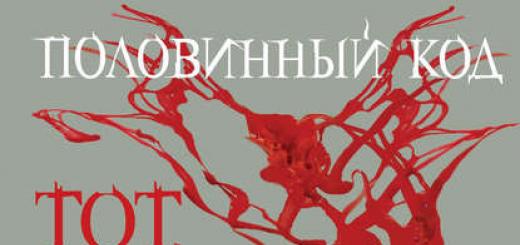The poem “How often surrounded by a motley crowd” is considered one of the most secret lyrical confessions in the history of Russian poetry. Pessimism and a tragic attitude are read literally in every line. Brief analysis“How often surrounded by a motley crowd” according to the plan will help schoolchildren in a literature lesson in grade 10 to better understand how Lermontov saw the world.
Brief analysis
History of creation- this poem was written under the impression of a costume ball, which was given in honor of the New Year holidays and which was attended by the emperor himself. That is why Nicholas the First perceived this work as an insult to myself.
Theme of the poem- denunciation secular society: soulless, cold and constantly hiding behind masks.
Composition- it can be conditionally divided into three parts. The first consists of two stanzas and describes a world alien to the poet, noisy and brilliant, but empty inside. The second part is a story about his bright dreams, when the past and the imaginary are dearer to him than the present and the real. And in the third part, the lyrical hero challenges the people having fun.
genre- a lyric poem.
Poetic size- a combination of four- and six-foot iambic.
epithets – “motley crowd”, “soulless people”, “cold hands”, “old dream”, “free bird”.
Metaphors – “I caress the dream”, “the village is smoking”, “yellow sheets are making noise”, “the noise of the crowd will frighten away”.
Comparison – “like a young day behind the grove the first radiance”, “like a fresh island harmless in the midst of the seas”.
History of creation
Turgenev in his memoirs spoke about the New Year's holiday - a masquerade ball, which was also attended by Lermontov. According to the writer, young man was clearly uncomfortable in the crowd of people who did not give him rest. Somewhere in this crowd I got lost and Russian emperor. Lermontov, on the other hand, looked distant and sad.
It was after this ball that the poet wrote the poem “How often he is surrounded by a motley crowd”, adding the author's epigraph, in which he clearly indicated the date of the event - January 1, 1840. By this he aroused considerable anger of Nicholas the First, who immediately realized what kind of people became the objects of this poetic accusation. In a certain way, it affected royal family, so that the hostile attitude towards Lermontov on the part of the emperor became even more aggravated.
The verse was published in Otechestvennye Zapiski in the year of its writing. Critics highly appreciated him - it became clear that a new luminary was rising in the horizon of Russian poetry, and this was a civil poet, striving to turn the poetic word to the fight against the vices of society.
Topic
The poem tells about the coldness and soullessness of secular society, on the one hand, and the bright places of the poet, on the other. It is obvious that, being surrounded by such people, the lyrical hero will never be able to live the way he wants. The main idea of the work is the constant confrontation between man and the crowd, which is the central theme of all Lermontov's poetry.
Composition
The theme is revealed by Lermontov with the help of the contrast between the parts of the poem, which clearly demonstrates the poet's pessimistic views and his gloomy mood. Thanks to the overlap between the first and third movement, he creates a frame composition.
So, in the first part, he recreates a retrospective of the ball, where everything is noisy and glitters, but people are hiding behind masks. They have fun and do not want to leave alone the poet himself, who sees everything around him as dead and frightening.
In contrast to this, in the second part of the poem, his childhood memories of his native places, long walks in nature and sweet loneliness, when you could just be alone with life, appear.
And the more difficult it is for the poet, who has sunk into dreams, to return to the ballroom - therefore, the third part not only echoes the first, it is filled with anger: the poet wants to throw his accusatory verses in the face of these people.
genre
This is a lyrical poem, written in the accusatory manner usual for Lermontov. Lyrical hero opposed to society, active protest - idle gaiety. The poem is written in iambic tetrameter and sixmeter.
means of expression
The poet uses a lot means of expression, which makes his work not only bright and emotional, but also rich artistic images. So, Lermontov uses the following tropes:
- epithets- “variegated crowd”, “soulless people”, “cold hands”, “old dream”, “free bird”.
- Metaphors- “I caress the dream”, “the village is smoking”, “yellow sheets are rustling”, “the noise of the crowd will frighten away”.
- Comparison- “like a young day behind the grove the first radiance”, “like a fresh island harmless among the seas”.
It also uses compositional antithesis, which helps to understand the worldview of Lermontov and his attitude to poetic creativity.
How often, surrounded by a motley crowd,
When in front of me, as if through a dream,
With the noise of music and dance,
At the wild whisper of hardened speeches,
Flickering images of soulless people,
Properly tightened masks,
When my cold hands touch
With the careless boldness of urban beauties
Long untrembling hands, -
Outwardly immersed in their brilliance and vanity,
I caress an old dream in my soul,
Lost years holy sounds.
And if somehow for a moment I succeed
To be forgotten - a memory of recent antiquity
I fly free, free bird;
And I see myself as a child, and around
Native all places: high manor house
And a garden with a destroyed greenhouse;
A green net of herbs will cover a sleeping pond,
And behind the pond the village smokes - and they get up
In the distance fog over the fields.
I enter the dark alley; through the bushes
The evening beam looks, and yellow sheets
Noisy under timid steps.
And a strange melancholy oppresses my chest;
I think about her, I cry and love,
I love the dreams of my creation
With eyes full of azure fire,
With a pink smile like a young day
Behind the grove the first radiance.
So the kingdom of the marvelous almighty lord -
I spent long hours alone
And their memory lives on to this day.
Under a storm of painful doubts and passions,
Like a fresh island harmless among the seas
Blooms in their wet desert.
When, having come to my senses, I will recognize the deception
And the noise of the human crowd will frighten away my dream,
An uninvited guest on a holiday,
Oh, how I want to embarrass their cheerfulness
And boldly throw an iron verse into their eyes,
Filled with bitterness and anger!
Analysis of the poem "How often, surrounded by a motley crowd" Lermontov
M. Yu. Lermontov, towards the end of his life, completely cooled to secular image life. From birth, he was inherent in the desire for loneliness, intensified by a passion for romanticism. Lermontov had strong convictions that he could not freely express in the highest circles. His open views aroused ridicule and suspicion. This closed the poet even more in himself, he gave the impression of a constantly gloomy and gloomy person. But the position of the nobility obliged him to attend the most important secular balls. One of these masquerade balls took place in January 1840. The poet reluctantly visited it and expressed his feelings in the poem "How often, surrounded by a motley crowd ...".
Already from the first lines, the poet's irritation from what is happening is felt. Balls were accompanied by the observance of strict decorum and refined speeches to the sounds of beautiful music. The characterization of the ball by Lermontov gives a completely different picture: “dance”, “wild whisper”, “soulless images”. The author knows that everyone present is well aware of the unnaturalness of what is happening, but they will never admit it. Any ball is saturated with falsehood and deceit. People's conversations do not make sense and do not touch on any meaningful topics. Mutual hatred and anger is hidden under masks. Moreover, under the masks, Lermontov means not so much paper decorations as unnatural faces of people. The generally recognized beauties have long lost their freshness and charm, their feelings have become dulled from endless romances.
Lermontov's only salvation during the ball is to be carried away by memories of his distant childhood with his naive dreams and hopes. The poet, only as a child, could devote himself wholeheartedly to the beauty of the surrounding landscape. He was not yet familiar with the vicious and deceitful human society. These memories awaken in the author's heart a long-forgotten feeling of pure love for life. They allow him to feel young and full of energy again. Lermontov can be in such a pleasant oblivion for a long time, protecting himself from the outside world. It was for this complete immersion in oneself that the poet was given the bad reputation of a closed and unsociable person.
The longer the poet stays in this state, the more painful and tragic his parting with him. "The noise of the crowd of people" brings him to his senses. Lermontov, as after a deep sleep, looks around with horror and again sees the hated picture of disgusting fun. This infuriates him. The poet dreams of breaking the idyll with some daring trick. Realizing that this would lead to the final fall of his authority, Lermontov limited himself to the “iron verse”, which was the work “As often, surrounded by a motley crowd ...”.
How often, surrounded by a motley crowd (Lermontov)
"How often, surrounded by a motley crowd"
How often, surrounded by a motley crowd,
When in front of me, as if through a dream,
With the noise of music and dance,
At the wild whisper of hardened speeches,
Flickering images of soulless people,
Properly tightened masks,
When my cold hands touch
With the careless boldness of urban beauties
Long untrembling hands, -
Outwardly immersed in their brilliance and vanity,
I caress an old dream in my soul,
Lost years holy sounds.
And if somehow for a moment I succeed
To be forgotten - a memory of recent antiquity
I fly free, free bird;
And I see myself as a child; and around
Native all places: high manor house
And a garden with a destroyed greenhouse;
A green net of herbs will cover a sleeping pond,
And behind the pond the village smokes - and they get up
In the distance fog over the fields.
I enter the dark alley; through the bushes
The evening beam looks, and yellow sheets
Noisy under timid steps.
And a strange melancholy oppresses my chest:
I think about her, I cry and love,
I love the dreams of my creation
With eyes full of azure fire,
With a pink smile like a young day
Behind the grove the first radiance.
So the kingdom of the marvelous almighty lord -
I spent long hours alone
And their memory lives on to this day.
Under a storm of painful doubts and passions,
Like a fresh island harmless among the seas
Blooms in their wet desert.
When, having come to my senses, I will know the deceit,
And the noise of the human crowd will frighten away my dream,
On a holiday an uninvited guest,
Oh, how I long to confuse their gaiety,
And boldly throw an iron verse into their eyes,
Filled with bitterness and anger!
M.Yu. Lermontov
"How often surrounded by a motley crowd"- a creative work in poetic form, created in 1840 by Mikhail Yuryevich Lermontov.
This poem is estimated by many critics as one of the most significant poems of Lermontov, in its spiritual mood and emotional pathos close to the "Death of a Poet". According to contemporaries, this poem was written after Lermontov's visit to the masquerade on the night of January 1-2, 1840. The publication entailed new persecution of the poet, who had recently been "forgiven". The theme of the masquerade is symbolic. Comparing the poem with "Masquerade", it is easy to understand that a mockery of the specific features of life is nothing more than the poet's emphasizing all the falsity of secular society. An imaginary past, bright dreams compete in the poet's mind with a ghostly reality saturated with lies and a "mask". And this dirt of reality causes nothing in Lermontov's soul but contempt.
Literature
- Collection "Lermontov" Lyric "" edited by E. D. Volzhina.
- Collection "Lermontov's "Selected Poems"" edition of 1982.
| Mikhail Yurjevich Lermontov | ||
|---|---|---|
| Prose | Ashik Kerib · Vadim · Hero of our time · Caucasian (feature) · Princess Ligovskaya · Panorama of Moscow · Stoss · I want to tell you |  |
| poems | Azrael · Angel of Death · Aul Bastunji · Fugitive · Boyar Orsha · Two slave girls · Daemon · Julio · Ismail Bay · Confession · Last son liberties · Prisoner of the Caucasus · callas · Corsair · Litvinka · mongo · Sailor · Mtsyri · Oleg · A song about Tsar Ivan Vasilievich, a young guardsman and a daring merchant Kalashnikov · Criminal · Sasha · Fairy tale for children · Tambov Treasurer · Hadji Abrek · Circassians | |
| Plays | Arbenin · Two brothers · Spaniards · Masquerade · A strange man · Gypsies (outline) · Menschen und Leidenschaften (people and passions) | |
| Poems | Angel · Ballad (In the hut, sometimes later ...) · Ballad (Over the sea, a beautiful maiden ...) · Barteneva · Bashilov · Gratitude · Thanks to! · Shining, clouds run through ... · The battle · Borodino · Bukharin · To album · Valerik · Venice · Spring · Branch of Palestine · Evening after the rain · Take a look at this face... · Vision · Airship · Will · I go out alone on the road… · Silly beauty · Looking to the future with dread... · Countess Rostopchina · Hussar · Gifts of the Terek · Two giants · Treaty · Dodo · Thought · There are speeches - meaning ... · Desire · Cupid's delusion · Forget your hopes again... · Will · Star (Above one ...) · Call hope a dream... · And boring and sad · From Goethe (Mountain peaks…) · From under the mysterious, cold · half masks... · Confession · Be with me, as you used to be ... · My friend, vain effort! .. · I will not humiliate myself before you... · When you are cold... · To the portrait · Cossack lullaby · Like a spirit of despair and evil... · Dagger · Cemetery · When in the humility of ignorance ... · When the yellowing field worries ... · When a story is said to you ... · leaflet · Dead man's love · Martynova · The blizzard is noisy, and the snow is falling ... · my demon · Prayer (Don't blame me...) · Monologue · On secular chains ... · In the wild north stands alone ... · On silver spurs... · Hope · Naryshkina · The day will come - and condemned by the world ... · Do not laugh… · Often people scolded ... · No, I don't love you so passionately... · No, I'm not Byron, I'm different... · Beggar · Alone in the midst of human noise ... · Loneliness · He was born to be happy... · She sings - and the sounds melt ... · They loved each other… · Fear · excerpt · From what · Sail · I have a piece of paper in front of me... · Dedication N.N. · Poet · Prediction · You are beautiful, fields ... · Prophet · Farewell, unwashed Russia... · May I love someone... · Parting · remorse · We parted, but your portrait ... · To kid · motherland · Mermaid · Russian melody · Saburova · It's done! full of expectation... · September 28 · Silhouette · Blind man, inspired by suffering... · Can I hear your voice... · Boldly believe that forever ... · Death of poet · Advice · Neighbor · Hurrying north from afar ... · Stanzas (Look...) · Stanzas (Instantly running through the mind ...) · happy moment · Tamara · Three palm trees · Cane · clouds · You could be the best king... · Uvarova · The terrible fate of father and son ... · Prisoner · Cliff · Shcherbatova · Epitaph · I once saw her in the merry whirlwind of a ball... · I saw the shadow of bliss; but quite... · I want to live! I want sadness · I'm not for angels and paradise ... · I do not love you… · How often, surrounded by a motley crowd | |
It is necessary to read the verse “How often, surrounded by a motley crowd” by Lermontov Mikhail Yuryevich as a work that reveals the contradictory inner world of the poet. The young man realized early on that he was not created for secular life, however, having arrived in Moscow on vacation in January 1840, he plunged into it and immediately felt disgusted. He conveys this emotion in a poem written at the same time.
The lines read online or at a literature lesson in the classroom, on the one hand, immerse the author in the world of dreams, who recalls his carefree childhood, secluded from everyone, on the other hand, it is easy to feel his irritation when secular reality breaks into the world of dreams. At such moments, the poet wants to convey to others the bitterness and anger that overwhelm him, which is directly stated in the text of Lermontov's poem “How often, surrounded by a motley crowd”.
If you study it completely, it is also easy to see what a controversial personality the author is: he is a dreamy young man on the one hand and a cynic who is disillusioned with life on the other. He wants life to be full of meaning, but he cannot find it, and therefore he splashes out his irritation and annoyance on people and himself, including in bilious poetic lines.
How often, surrounded by a motley crowd,
When in front of me, as if through a dream,
With the noise of music and dance,
With the wild whisper of hardened speeches,
Flickering images of soulless people,
Properly tightened masks,
When my cold hands touch
With the careless boldness of urban beauties
Long untrembling hands, -
Outwardly immersed in their brilliance and vanity,
I caress an old dream in my soul,
Lost years holy sounds.
And if somehow for a moment I succeed
To be forgotten - a memory of recent antiquity
I fly free, free bird;
And I see myself as a child; and around
Native all places: high manor house
And a garden with a destroyed greenhouse;
A green net of herbs will cover a sleeping pond,
And behind the pond the village smokes - and they get up
In the distance fog over the fields.
I enter the dark alley; through the bushes
The evening beam looks, and yellow sheets
Noisy under timid steps.
And a strange melancholy oppresses my chest:
I think about her, I cry and love,
I love the dreams of my creation
With eyes full of azure fire,
With a pink smile like a young day
Behind the grove the first radiance.
So the kingdom of the marvelous almighty lord -
I spent long hours alone
And their memory lives on to this day.
Under a storm of painful doubts and passions,
Like a fresh island harmless among the seas
Blooms in their wet desert.
When, having come to my senses, I will know the deceit,
And the noise of the human crowd will frighten away my dream,
On a holiday an uninvited guest,
Oh, how I long to confuse their gaiety,
And boldly throw an iron verse into their eyes,
Filled with bitterness and anger!
The themes of Lermontov's poems have always been distinguished by their diversity, but lyricism occupied a special place in the work of the great Russian classic. Mikhail Yuryevich, as a teenager, always dreamed of getting to the ball, to shine in, but when his dream finally came true, he realized how hypocritical all the people around him were. The man quickly lost interest in tricks, stilted conversations that were meaningless and radically different from the surrounding reality.
An analysis of Lermontov’s “How often he is surrounded by a motley crowd” makes it possible to understand how difficult it was for the poet to be among those who put on friendly masks, but did not have a heart, pity and conscience. Mikhail Yuryevich himself did not know how to conduct a secular conversation, he never complimented women, and when, according to etiquette, it was necessary to maintain a conversation, he became too sarcastic and harsh. Therefore, Lermontov was called a rude and ill-mannered person who despises etiquette.
The poem “How often surrounded by a motley crowd” was written in January 1840, just during this period the writer received a vacation and came to visit Moscow for several weeks. At this time, winter balls were held one after another, although Mikhail Yuryevich did not want to attend social events, but he could not ignore them either. An analysis of Lermontov's "How often he is surrounded by a motley crowd" makes it possible to understand how alien the people around him are to the author. He is among the bustle of colorfully dressed ladies and gentlemen, leading secular conversations, and he himself is immersed in thoughts of irretrievably past days.

Mikhail Lermontov kept memories of his childhood in his memory, when he was still happy. Thoughts carry the poet to the village of Mikhailovskoye, where he lived with his parents. He cherishes that period of carefree childhood, when his mother was alive, and he could spend hours wandering around the garden with a destroyed greenhouse, rake fallen yellow leaves and live in a high manor house. An analysis of Lermontov's "How often he is surrounded by a motley crowd" shows how different the idealistic picture drawn by the author's imagination is from reality, in which he is surrounded by images of soulless people, a "whisper of hardened speeches" is heard.
At secular receptions, Mikhail Yuryevich preferred to retire to a secluded place and indulge in dreams there. He personified his dreams with a mysterious stranger, he himself came up with her image and found it so charming that he could sit for hours without noticing the hustle and bustle of the crowd scurrying around. An analysis of Lermontov’s “How often he is surrounded by a motley crowd” makes it possible to understand how difficult it was for the poet to restrain his feelings and cover up his impulses with an insensitive mask.

Michael's moments of solitude ended sooner or later, and someone from those present interrupted his dreams with meaningless chatter. Upon returning to real world he really wanted to throw something caustic into the eyes of the hypocrites, pour anger and bitterness on them, spoil the fun. The poem “How often surrounded by a motley crowd” ideally characterizes the unpredictable and contradictory inner world poet, because it combines both romance and aggression.










